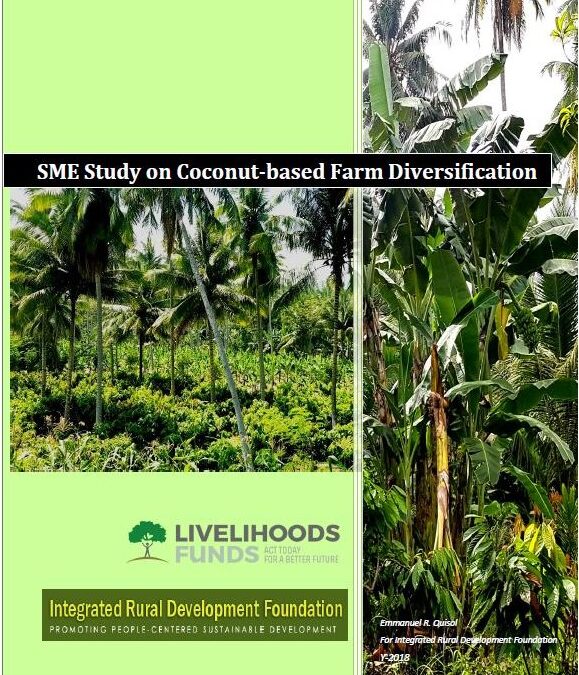A Study: Introduction to Coconut Intercropping Products Value Chains.
Assessing Opportunities for Market and Profitability in the Philippines.
The coconut industry is a cornerstone of the Philippine economy, playing a vital role in the agricultural sector and the livelihoods of millions of Filipinos. Covering 26% of the nation’s agricultural land, coconuts are grown on approximately 3.612 million hectares across 68 provinces. As of 2017, more than 329.9 million coconut-bearing trees thrive in the country, making the Philippines one of the largest producers of coconuts globally. The industry generates over 1 billion US dollars annually in export earnings, particularly from Mindanao, which accounts for 42% of the nation’s coconut cultivation and 59% of its total coconut production.
Despite the coconut sector’s significant contribution to the economy, many coconut farmers remain among the poorest in the country. These challenges are exacerbated by low farm productivity, which stems from aging coconut trees and an aging farmer population. Many younger generations are leaving rural areas to pursue more lucrative careers in cities or abroad, leading to a lack of succession planning. Moreover, fragmented farming practices and limited access to technical and financial support services further hinder farmers’ ability to improve their livelihoods.
In response to these challenges, key stakeholders in the desiccated coconut sub-sector have launched a 10-year initiative aimed at improving the livelihoods of coconut farmers in Mindanao. This collaborative effort, led by the Integrated Rural Development Foundation (IRDF), seeks to mobilize 5,000 smallholder farmers across the region. The project focuses on enhancing coconut farming practices, promoting youth and women entrepreneurship, and creating sustainable, traceable value chains for coconut-based products.
Project Objectives and Key Activities
The project’s primary objectives are to:
- Scale-up existing initiatives: This includes intercropping, valorizing coconut by-products, and providing market-linkage support to improve farmers’ incomes.
- Empower farmers: By adopting sustainable practices, farmers can better manage their farms, increase yields, and replace aging coconut trees with high-yielding varieties.
- Enhance post-harvest practices: Improved harvesting techniques will ensure better product quality and higher market value.
- Direct-sourcing agreements: Through partnerships with companies like Franklin Baker and Mars, the project aims to establish a direct-sourcing scheme that benefits both farmers and industrial users.
- Promote entrepreneurship: By setting up small-scale transformation units for various coconut-based products and intercrops, the project fosters entrepreneurship, particularly among women and youth.
The project is being rolled out in key municipalities in Mindanao, including Magsaysay in Davao del Sur, Kidapawan City, and Makilala in North Cotabato.
Assessment of Intercropping Opportunities
To identify the most viable intercropping options, IRDF commissioned an assessment of technical, social, and economic opportunities for coconut intercropping product value chains. The study involved a selection process where farmers identified their preferred intercrops based on social, economic, agronomic, and environmental criteria. The intercrops selected were rubber, coffee, cacao, banana, and mango.
Among these, cacao and cardava (saba) bananas emerged as the top choices, particularly in Kidapawan City and Makilala, North Cotabato. These crops were preferred due to their familiarity to farmers, ease of implementation, household utility, symbiotic relationship with coconut trees, manageable production costs, and the availability of organic markets. In Magsaysay, Davao del Sur, carabao mango was also highly favored due to its local prevalence and market potential.
Next Steps: Small and Medium Enterprise (SME) Study
To further refine the project and maximize the potential of the selected intercrops, an additional SME study will be conducted. This study will focus on:
- Processing and profitability analysis: Examining different processing options and their profitability for farmers, with particular attention to mangoes in Magsaysay.
- Investment assessment: Determining the level of investment needed from production to marketing.
- Market analysis: Evaluating various market opportunities at local, national, and international levels, and identifying potential off-takers for intercrop products.
- Job creation potential: Assessing the potential for job creation throughout the supply chain.
- Optimal marketing structure: Identifying the best marketing structures, such as cooperatives or social enterprises, for large-scale production and distribution.
- Government support: Reviewing governmental programs that support each crop to align with potential funding opportunities.
This comprehensive approach aims to ensure that the coconut intercropping initiative not only enhances farmers’ livelihoods but also creates a sustainable and profitable value chain that benefits all stakeholders involved. By addressing the challenges faced by coconut farmers and capitalizing on the opportunities presented by intercrops, this project has the potential to significantly contribute to the economic development of Mindanao and the broader Philippines.
Conclusion
The future of the coconut industry in the Philippines depends on innovative solutions and collaborative efforts. This project represents a critical step toward unlocking the full potential of coconut intercropping, with the promise of improved livelihoods, sustainable farming practices, and stronger value chains. We encourage stakeholders, researchers, and practitioners to delve into the attached documents to better understand the project’s scope, methodologies, and findings. Your engagement and expertise are crucial in driving this initiative forward and ensuring its long-term success.
SME Study_IRDF_EQuisol Whole Nuts_Copra Tableya Processing P&L Template_Crops2 Mango Puree_Jam Cardava Banana_600 Cacao Production_1000_Updated Cacao Production_600 _Updated Banana Chips

